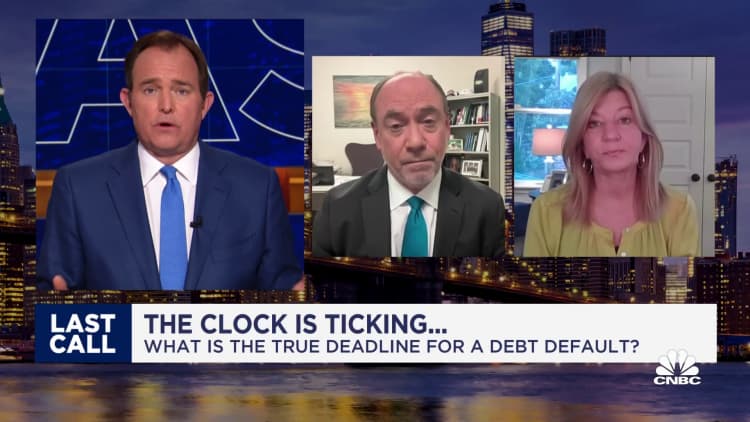Yellow Dog Productions | Getty Images
Preston Cherry, a certified financial planner and founder and president of Concurrent Financial Planning in Green Bay, Wisconsin, said the debt ceiling has led to “anxiety stacking” among investors with existing financial concerns.
That unease may be greater among retirees, those nearing retirement and even Gen Xers, who may be facing a retirement savings gap, said Cherry, who is also a member of CNBC’s Financial Advisor Council.
While it’s tough to predict how the stock market may respond to the coming debt ceiling negotiations, experts have tips for investors.
1. Avoid ’emotional selling’
When facing market volatility from events like the Russia-Ukraine war or the debt ceiling standoff, Cherry said it’s important to avoid “emotional selling,” especially when the market plunges. “These events do occur,” he said. “So we want to help mitigate the emotional and financial effects.”
These events do occur, so we want to help mitigate the emotional and financial effects.
Preston Cherry
Founder and president of Concurrent Financial Planning
One reason why emotional selling can be so damaging is that investors may hesitate to reenter the market, according to Lee Baker, a CFP and owner of Apex Financial Services in Atlanta.
“They wait until after the market has gone back up when they’re comfortable again,” and they miss the recovery, said Baker, who is also a member of CNBC’s Financial Advisor Council.
Indeed, the stock market’s 10 top-performing days from 2002 through 2022 happened after big declines during the 2008 economic crisis or 2020 volatility from the Covid-19 pandemic, according to a JPMorgan analysis.
“In the grand scheme of things, I think [the debt ceiling] will get worked out,” Baker said. “Over a decade ago, it was ugly for a period. But we clearly rebounded fairly well.”
2. Watch for buying opportunities
One of the silver linings of market volatility can be the chance to buy more assets at a reduced price, assuming you’ve already met other financial goals. “Everybody likes a good sale,” said Cherry, noting that a 10% to 15% drop could be a solid buying opportunity.
Baker is also watching for dips around 10% to “deploy fresh capital” by keeping cash in a floating-rate Treasury exchange-traded fund that can be sold quickly if needed. “If there’s a tumble, let’s get some stuff on the cheap,” he said.

3. Maintain cash reserves
While it may be tempting to purchase assets at a discount, it’s also important to maintain your cash.
Most Americans aren’t ready for a financial emergency, according to a recent CNBC/Momentive survey. More than half of Americans don’t have an emergency fund, and 40% of those who do have less than $10,000, the survey shows.
While experts commonly suggest keeping three to six months of living expenses in cash, others may suggest more significant reserves based on how long unemployment may last.
Cash is also essential for retirees, who may need liquidity to avoid selling assets when the market is down. Known as the “sequence of returns risk,” research shows tapping your portfolio during market downturns causes long-term harm to your nest egg.
“You need to have some months in reserve to get through these periods,” said Baker, who advocates for keeping at least 12 months of portfolio distributions in cash.
 EU News Digest Latest News & Updates
EU News Digest Latest News & Updates



